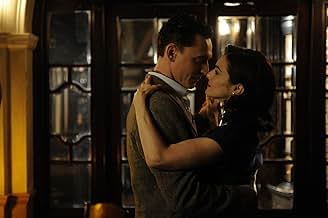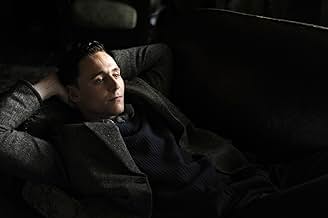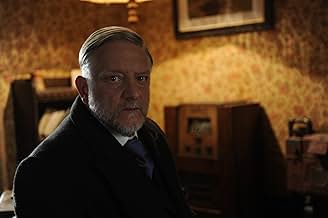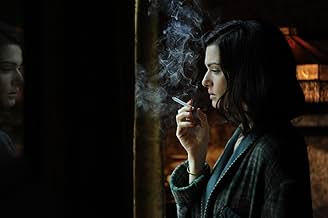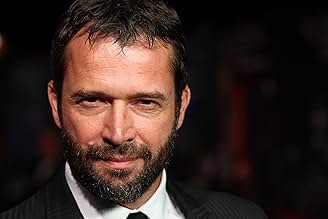The Deep Blue Sea
- 2011
- Tous publics
- 1h 38min
NOTE IMDb
6,2/10
17 k
MA NOTE
L'épouse d'un juge britannique est en proie à une histoire d'amour autodestructrice avec un pilote de la Royal Air Force.L'épouse d'un juge britannique est en proie à une histoire d'amour autodestructrice avec un pilote de la Royal Air Force.L'épouse d'un juge britannique est en proie à une histoire d'amour autodestructrice avec un pilote de la Royal Air Force.
- Réalisation
- Scénario
- Casting principal
- Récompenses
- 5 victoires et 13 nominations au total
Jorge Ojeda-Dávila
- Man in Bunker Bed
- (non crédité)
Owen Thomas
- Caretaker
- (non crédité)
Avis à la une
I've been putting off review The Deep Blue Sea. Terrence Davies' remake of the 1950′s film based on the stage-play is a curious piece which I'm still struggling to get my head around.
It's a strangely polarising beast which split me between annoyance and er enjoyance
Here's the deal. On the one hand. It's a self-consciously old-fashioned portrayal of love and life in 1950′s London. Rachel Weiss plays Hester trapped in a flat and dull marriage she finds physical and emotional release in the arms of Freddie (played by Tom Hiddleston) a magnetic yet damaged WW2 pilot who is struggling to adjust to post-war life. The story is stylistic lavish with intimate set-pieces, evocative lighting and a mood of emotional frustration. What's not is as important as what is not said. There's evocations of Brief Encounter and Powell & Pressburger. An impressive meditation on love in all its forms and the damage it can cause.
On the other hand. It's an out-dated throw-back from a director who is stuck in time with a Britain that never really existed. Pampered hoity-toity, plummy-types (Hester? Freddie? Oh, 'k off!) moping and whining while the salt of the earth "Cor Blimey" types are just busy getting by. Posh types mope. Look out of windows. Smoke. Mope a bit more. Look out of more windows. Have a bit of a row. Cry. Look out of even more windows. Gah! Hester treats her husband like rubbish. Freddie treats Hester like rubbish. Hester treats herself like rubbish. It's so mannered and drenched in stylistic devices and cinematic tropes that they become at best distracting, at worst like a cinema school project with a budget.
So where does that leave us? Nostalgic meditation on love? Or stylised bore-fest of posh-types gagging for it? To be honest I'm still stuck between a rock and a hard place. Between, the devil and the . hmmm hang-on . it's suddenly occurred to me that maybe that's the point. Christ, I think I need to watch something stupid to clear my brain.
It's a strangely polarising beast which split me between annoyance and er enjoyance
Here's the deal. On the one hand. It's a self-consciously old-fashioned portrayal of love and life in 1950′s London. Rachel Weiss plays Hester trapped in a flat and dull marriage she finds physical and emotional release in the arms of Freddie (played by Tom Hiddleston) a magnetic yet damaged WW2 pilot who is struggling to adjust to post-war life. The story is stylistic lavish with intimate set-pieces, evocative lighting and a mood of emotional frustration. What's not is as important as what is not said. There's evocations of Brief Encounter and Powell & Pressburger. An impressive meditation on love in all its forms and the damage it can cause.
On the other hand. It's an out-dated throw-back from a director who is stuck in time with a Britain that never really existed. Pampered hoity-toity, plummy-types (Hester? Freddie? Oh, 'k off!) moping and whining while the salt of the earth "Cor Blimey" types are just busy getting by. Posh types mope. Look out of windows. Smoke. Mope a bit more. Look out of more windows. Have a bit of a row. Cry. Look out of even more windows. Gah! Hester treats her husband like rubbish. Freddie treats Hester like rubbish. Hester treats herself like rubbish. It's so mannered and drenched in stylistic devices and cinematic tropes that they become at best distracting, at worst like a cinema school project with a budget.
So where does that leave us? Nostalgic meditation on love? Or stylised bore-fest of posh-types gagging for it? To be honest I'm still stuck between a rock and a hard place. Between, the devil and the . hmmm hang-on . it's suddenly occurred to me that maybe that's the point. Christ, I think I need to watch something stupid to clear my brain.
This film is recommended.
Based on Terence Rattigan's 1952 play, The Deep Blue Sea is stylish soap opera at its best, and an overly ripe melodramatic downer at its worst. The film is reminiscent of the type of films that were popular fare in the fifties. ( And please, don't confuse it with the similarly titled shark attack movie some years back. ) No blood is spilled in this movie adaptation, but many lives are destroyed as loss and suffering does take its toll.
It is post-war Britain. Ruins are everywhere, from the bombed-out buildings to the people who inhabit them. There is a drabness in their hopeless lives, their colorless clothes, and their everyday routines. One such person is Hester Collyer, an unhappy romantic soul, trapped in a comfortable but loveless marriage to Sir William, a wealthy judge. Of course this means only one thing: suicide or an affair is in the offing. Fortunately ( or unfortunately, as the case may be ) after she meets a dashing but lonely RAF pilot named Freddie, there is a temporary respite from her real world. Lust, sin, and passion become the missing strands to her unraveling world ( which is not too surprising when one sees Hester's blatant scarlet red coat that overtly signals a Prynne moment is upon us. No subtlety lost here. Code Red, or is that Coat Read? )
This period melodrama is terribly British with a capital B. All proper diction, words unsaid, and formal reserve. Everyone is so noble and refined. Writer / director Terence Davies evokes the right atmospheric mood as we become lost in Hester's memories. He has a fine visual eye for those bittersweet times and Davies sensitively recalls the aftermath of WWII most efficiently with his use of popular and classical music and strong imagery, especially the impressive Underground bomb shelter scene. After an overly slow beginning, the director paces his film quite well using sounds, silences, and pauses in the characters' reactions to their conversations most effectively in telling his tale of a love undone.
The film sporadically uses these moments to tell the story of the makings of a passionate love affair, but its fragmented structure never allows us to understand Hester's attraction and her rationale to her self-proclaimed changes in her life. She's portrayed as a sympathetic victim, yet this character chooses the very unhappy lifestyle that she now wallows in, and we moviegoers are unable to see the results of her actions. It's as if some parts to her past are missing and sketchy, especially the happier times.
As the damaged Hester, Rachel Weisz is quite smashing. This talented actress fills her slightly underdeveloped role with such clarity and depth. ( Her scene in the pub as she stares into her lover's eyes while becoming uninvolved with the rowdy goings-on during the sing- along of a Jo Stafford tune says more than mere words could have expressed. ) It is a powerful nuanced performance. Completing the love triangle is Simon Russell Beale as her concerned husband and Tom Hiddleston as her cad of a lover. Both actors create indelible contrasting personalities, although the character of Freddie comes off the worst of the pair. Solid support from Ann Mitchell as Hester's landlady and Barbara Jefford is Hester's judgmental mother-in-law round out this wonderful ensemble.
The Deep Blue Sea is a successful throwback to the the great David Lean film, Brief Encounter. Only this time, the encounter is not brief and fleeting, just fleeting. It takes the moviegoer back to a former time, unlike today, when movies had a heart and mind, and dare I say, soul. GRADE: B
NOTE: Visit my movie blog for more reviews: www.dearmoviegoer.com
Based on Terence Rattigan's 1952 play, The Deep Blue Sea is stylish soap opera at its best, and an overly ripe melodramatic downer at its worst. The film is reminiscent of the type of films that were popular fare in the fifties. ( And please, don't confuse it with the similarly titled shark attack movie some years back. ) No blood is spilled in this movie adaptation, but many lives are destroyed as loss and suffering does take its toll.
It is post-war Britain. Ruins are everywhere, from the bombed-out buildings to the people who inhabit them. There is a drabness in their hopeless lives, their colorless clothes, and their everyday routines. One such person is Hester Collyer, an unhappy romantic soul, trapped in a comfortable but loveless marriage to Sir William, a wealthy judge. Of course this means only one thing: suicide or an affair is in the offing. Fortunately ( or unfortunately, as the case may be ) after she meets a dashing but lonely RAF pilot named Freddie, there is a temporary respite from her real world. Lust, sin, and passion become the missing strands to her unraveling world ( which is not too surprising when one sees Hester's blatant scarlet red coat that overtly signals a Prynne moment is upon us. No subtlety lost here. Code Red, or is that Coat Read? )
This period melodrama is terribly British with a capital B. All proper diction, words unsaid, and formal reserve. Everyone is so noble and refined. Writer / director Terence Davies evokes the right atmospheric mood as we become lost in Hester's memories. He has a fine visual eye for those bittersweet times and Davies sensitively recalls the aftermath of WWII most efficiently with his use of popular and classical music and strong imagery, especially the impressive Underground bomb shelter scene. After an overly slow beginning, the director paces his film quite well using sounds, silences, and pauses in the characters' reactions to their conversations most effectively in telling his tale of a love undone.
The film sporadically uses these moments to tell the story of the makings of a passionate love affair, but its fragmented structure never allows us to understand Hester's attraction and her rationale to her self-proclaimed changes in her life. She's portrayed as a sympathetic victim, yet this character chooses the very unhappy lifestyle that she now wallows in, and we moviegoers are unable to see the results of her actions. It's as if some parts to her past are missing and sketchy, especially the happier times.
As the damaged Hester, Rachel Weisz is quite smashing. This talented actress fills her slightly underdeveloped role with such clarity and depth. ( Her scene in the pub as she stares into her lover's eyes while becoming uninvolved with the rowdy goings-on during the sing- along of a Jo Stafford tune says more than mere words could have expressed. ) It is a powerful nuanced performance. Completing the love triangle is Simon Russell Beale as her concerned husband and Tom Hiddleston as her cad of a lover. Both actors create indelible contrasting personalities, although the character of Freddie comes off the worst of the pair. Solid support from Ann Mitchell as Hester's landlady and Barbara Jefford is Hester's judgmental mother-in-law round out this wonderful ensemble.
The Deep Blue Sea is a successful throwback to the the great David Lean film, Brief Encounter. Only this time, the encounter is not brief and fleeting, just fleeting. It takes the moviegoer back to a former time, unlike today, when movies had a heart and mind, and dare I say, soul. GRADE: B
NOTE: Visit my movie blog for more reviews: www.dearmoviegoer.com
Overindulgent and somewhat stuffy romantic drama that is saved single handedly by the Oscar caliber performance of Rachel Weisz, who gives a very complex and realistic look at a women whose self destructing over her choices in life in post war Britain in the 1950's. Weisz so good that she brings a lot of life into a somewhat lifeless screenplay that is more into atmosphere than substance. Both of her leading men are fine and lent great support to the vibrant Weisz, who is keeping this film afloat almost by herself while the movie gets a bit claustrophobic towards its climax. The film does have some great moments ( The pub scene and the intimate moment between Weisz and leading man Tom Hiddleston while dancing) but that's more the credit to Weisz and the cast than the film itself. Rachel Weisz has always been one of the most gifted and versatile actresses working today, not being afraid to do different characters and being unlikeable and raw in the process. In this film, she gives in my opinion the best female acting performance in the last few years, giving a complex and rich performance with a character that could have easily been botch by even a great actress, especially with a screenplay that is more into itself than the audience watching the movie. Weisz proves in this movie that she's more than a great actress, she proves that she is one of the best actresses we ever had.
Her phenomenal performance alone is the real reason to see this movie.
Her phenomenal performance alone is the real reason to see this movie.
After watching the Terence Rattigan DVD collection (with most of the adaptations being from the 70s and 80s) when staying with family friends last year, Rattigan very quickly became one of my favourite playwrights and he still is. His dialogue is so intelligent, witty and meaty, his characterisation so dynamic, complex and real and the storytelling so beautifully constructed.
'The Deep Blue Sea' may not be among my favourite Rattigan plays ('The Browning Version', 'The Winslow Boy', 'Separate Tables'), but it's still wonderful and distinctively Rattigan. The writing is 24-carat Rattigan and the story is timeless in its searing emotion and romantic passion. It's very sharply observant and witty at times too. Of the four versions seen of 'The Deep Blue Sea' (this, Penelope Wilton, Vivien Leigh and Helen McCrory), this one is my least favourite, the McCrory stage version coming out on top.
It certainly has its merits. Its best asset is the acting, with the creme De la creme being a stunning Rachel Weisz, a heart-breaking, passionate and sympathetic performance but with a dignity and strength that prevents Hester from being too passive. Tom Hiddleston brings charm to a very caddish role, while Simon Russell Beale successfully stops Collyer from being too one-sided and Barbara Jefford is suitably icy. Karl Johnson is a kindly Mr Miller and Ann Mitchell is solid as rocks. Weisz and Hiddleston have an intense and poignant chemistry together.
Visually, 'The Deep Blue Sea' looks beautiful. Especially the sublime and hauntingly atmospheric cinematography, which perfectly complements the sumptuous, evocative period detail. Terence Davies captures the passionate intensity and searing emotion of the story very well, there are some very affecting moments here and the tea scene at the mother's house is very well written and acted and the ending is powerful.
Rattigan's writing shines on the most part, heavy on talk (true of the play and Rattigan in general) but intelligent, sharply observant, thought-provoking and full of pathos and insight.
However, some aspects of 'The Deep Blue Sea' frustrate annoyingly. Too often, the film mood-wise takes itself too heavily and too seriously. The play has a serious subject, but Rattigan also in the play gave it his usual wit and verve that helped it not get too heavy. This wit and verve is completely lost here and as a consequence the film feels too dark in terms of mood and overly gloomy and the leaden pace in some scenes, which felt like it was stretched to pad things out, disadvantages it further.
Didn't know what to make of the music. With the pre-existing music, it is lovely music on its own but didn't fit with the film, being used in a way that felt overused and excessive that made the story more melodramatic than it actually is. Barber's beautiful Violin Concerto, played just as well by Hilary Hahn in one of the more famous interpretations of the work, is particularly true to this, on its own lovely, excessively melodramatic in how it was used in the film.
First 10-15 minutes were puzzling, with images that came over as very fragmented and self-indulgent and the flashbacks don't add as much as they ought and convolute the storytelling. Those unfamiliar with the play should not be put off and think the play is like how the story is presented here, with the messing around of chronology the story felt jumbled, disjointed and incomplete here whereas the structure and character motivations (which were not explored enough here meaning that the complex characters are not as complex) are much clearer in the play.
Overall, a lot of beautiful things but it was very frustrating when reminded constantly at how so much better the film could have been if told with more clarity and taken less seriously. 6/10 Bethany Cox
'The Deep Blue Sea' may not be among my favourite Rattigan plays ('The Browning Version', 'The Winslow Boy', 'Separate Tables'), but it's still wonderful and distinctively Rattigan. The writing is 24-carat Rattigan and the story is timeless in its searing emotion and romantic passion. It's very sharply observant and witty at times too. Of the four versions seen of 'The Deep Blue Sea' (this, Penelope Wilton, Vivien Leigh and Helen McCrory), this one is my least favourite, the McCrory stage version coming out on top.
It certainly has its merits. Its best asset is the acting, with the creme De la creme being a stunning Rachel Weisz, a heart-breaking, passionate and sympathetic performance but with a dignity and strength that prevents Hester from being too passive. Tom Hiddleston brings charm to a very caddish role, while Simon Russell Beale successfully stops Collyer from being too one-sided and Barbara Jefford is suitably icy. Karl Johnson is a kindly Mr Miller and Ann Mitchell is solid as rocks. Weisz and Hiddleston have an intense and poignant chemistry together.
Visually, 'The Deep Blue Sea' looks beautiful. Especially the sublime and hauntingly atmospheric cinematography, which perfectly complements the sumptuous, evocative period detail. Terence Davies captures the passionate intensity and searing emotion of the story very well, there are some very affecting moments here and the tea scene at the mother's house is very well written and acted and the ending is powerful.
Rattigan's writing shines on the most part, heavy on talk (true of the play and Rattigan in general) but intelligent, sharply observant, thought-provoking and full of pathos and insight.
However, some aspects of 'The Deep Blue Sea' frustrate annoyingly. Too often, the film mood-wise takes itself too heavily and too seriously. The play has a serious subject, but Rattigan also in the play gave it his usual wit and verve that helped it not get too heavy. This wit and verve is completely lost here and as a consequence the film feels too dark in terms of mood and overly gloomy and the leaden pace in some scenes, which felt like it was stretched to pad things out, disadvantages it further.
Didn't know what to make of the music. With the pre-existing music, it is lovely music on its own but didn't fit with the film, being used in a way that felt overused and excessive that made the story more melodramatic than it actually is. Barber's beautiful Violin Concerto, played just as well by Hilary Hahn in one of the more famous interpretations of the work, is particularly true to this, on its own lovely, excessively melodramatic in how it was used in the film.
First 10-15 minutes were puzzling, with images that came over as very fragmented and self-indulgent and the flashbacks don't add as much as they ought and convolute the storytelling. Those unfamiliar with the play should not be put off and think the play is like how the story is presented here, with the messing around of chronology the story felt jumbled, disjointed and incomplete here whereas the structure and character motivations (which were not explored enough here meaning that the complex characters are not as complex) are much clearer in the play.
Overall, a lot of beautiful things but it was very frustrating when reminded constantly at how so much better the film could have been if told with more clarity and taken less seriously. 6/10 Bethany Cox
i saw this with twenty something people. This was not a movie for them, but it is a most superior film for older people who have seen people live torturous lives. Why people do things that hurt themselves is a intriguing question which fascinates psychologists and artists alike. No one has come up with a satisfactory answer, not even a plausible one, and Freud leads the list of the clueless. Thus, Hester (played by a wonderful Rachel Weisz) can fascinate those of us who care about the inner working and emotional vicissitudes of a self destructive woman and who will learn about the human condition by considering her behavior. Simon Beale and Tom Hiddleston, the men in her life, are equally impressive performers playing equally limited (Beale) and troubled (Hiddleston) persons.
First, I think most people don't know where the title comes from. A song popular during the second world war (a recent event in this film), has the line "we're caught between perdition and the deep blue sea." This is an apt description of the three protagonists.
This film might be quite tedious for those in a hurry to move on with their lives. The three main characters are stuck and seem to have no capacity for getting unstuck. This is tough to contemplate if you can't wait for your tomorrow's great triumph, or if you see romance as a smooth road to your personal paradise.
The rest of us are mesmerized as these troubled lives unfold on screen. Yes, the mood and physical atmosphere are almost relentlessly dark (it needn't have been); The film is completely without humor, and it is much too slow moving. These are minor difficulties. The script and performances are magnificent.
First, I think most people don't know where the title comes from. A song popular during the second world war (a recent event in this film), has the line "we're caught between perdition and the deep blue sea." This is an apt description of the three protagonists.
This film might be quite tedious for those in a hurry to move on with their lives. The three main characters are stuck and seem to have no capacity for getting unstuck. This is tough to contemplate if you can't wait for your tomorrow's great triumph, or if you see romance as a smooth road to your personal paradise.
The rest of us are mesmerized as these troubled lives unfold on screen. Yes, the mood and physical atmosphere are almost relentlessly dark (it needn't have been); The film is completely without humor, and it is much too slow moving. These are minor difficulties. The script and performances are magnificent.
Le saviez-vous
- AnecdotesTerence Davies wanted Rachel Weisz for the part of Hester Collyer after he noticed her "incredible talent" in Au coeur de la tourmente (1997), even though he hadn't heard of her before seeing that film. He called his agent and asked, "Have you ever heard of this girl Rachel Weisz?" His agent laughed and said, "She's an Oscar winner!" Weisz was amused by this and said, "I don't think Terence [Davies] knows very well anyone who's not in a black and white film."
- Citations
Freddie Page: Let me give you a case: Jack loves Jill, Jill loves Jack. But Jack doesn't love Jill in the same way. Jack never asked to be loved.
Hester Collyer: And what about Jill?
Freddie Page: That's Jill's hard luck! I can't be bloody Romeo all the time!
- ConnexionsFeatured in Maltin on Movies: The Watch (2012)
- Bandes originalesConcerto for Violin and Ochestra, Op. 14
Composed by Samuel Barber
Published by G. Schirmer, Inc (ASCAP)
Performed by Hilary Hahn & The Saint Paul Chamber Orchestra
Conducted by Hugh Wolff
Licensed courtesy of Sony Music Entertainment Inc.
Meilleurs choix
Connectez-vous pour évaluer et suivre la liste de favoris afin de recevoir des recommandations personnalisées
- How long is The Deep Blue Sea?Alimenté par Alexa
Détails
- Date de sortie
- Pays d’origine
- Site officiel
- Langue
- Aussi connu sous le nom de
- Dục Vọng Đàn Bà
- Lieux de tournage
- Sociétés de production
- Voir plus de crédits d'entreprise sur IMDbPro
Box-office
- Montant brut aux États-Unis et au Canada
- 1 126 525 $US
- Week-end de sortie aux États-Unis et au Canada
- 123 841 $US
- 25 mars 2012
- Montant brut mondial
- 3 143 514 $US
- Durée1 heure 38 minutes
- Couleur
- Mixage
- Rapport de forme
- 1.85 : 1
Contribuer à cette page
Suggérer une modification ou ajouter du contenu manquant

Lacune principale
What was the official certification given to The Deep Blue Sea (2011) in Spain?
Répondre


